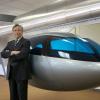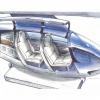The self-driving monorail would fly 20 feet above roads at speeds up to 155mph.
As if an eight hour work day isn’t enough, many people have to deal with grueling commutes that take even more hours out of their day.
However, a futuristic transportation system hopes to take away the hours wasted in traffic and trade it in for a few minutes soaring through the sky above it.
Meet SkyTran — a self-driving monorail that could turn a two-hour car commute into a 10-minute trip up in the sky, according to SkyTran CEO Jerry Sanders. The transportation system would hover 20 feet above the roads and travel at speeds up to 155 miles per hour.
SEE ALSO: Flying Car Approved for Testing in the United States
"Everyone hates commuting, but there are no solutions," Sanders said in an interview with Tech Insider’s Leanna Garfield. "The only way to get around traffic is to literally go above it.”
And while the technology seems extremely sci-fi, it’s actually not that far off. In fact, the company just announced that its first-ever track will be launched in Lagos, Nigeria by 2020.
Why Lagos? Due to its ever-growing population and island-locked financial hub, the city has some of the worst traffic jams in the world. As Garfield puts into perspective, the city has over twice the population as New York City, but about the same land area.
Back in 2015, SkyTran opened a 900-ft test station on the campus of Israel Aerospace Industries near Tel Aviv, and the company is set to start construction of a 25-mile track in Lagos by the end of 2016. The exact route has yet to be determined.
The transport system was developed by an engineer at NASA’s Ames Research Center, Doug Malewicki. NASA and SkyTran designed four different types of steel and aluminum pods — one seats two people, one seats four, one for the disabled, and one for larger cargo. The pods weigh in at 300 pounds and use magnets to hang from narrow rails.
You can see concept art for a pod below:

The system is impressively energy efficient. Once a pod reaches a speed of 10 mph, it can continue to glide without any additional power. With the help of a magnet, a short burst of electricity, and gravity, Sanders says that SkyTran uses the same amount of electricity as two hair dryers.
Further, the system will use machine learning to predict how many people will need pods and at what times. To request a pod, riders would simply type in a pick-up location and destination using the SkyTran app, and then hop in the first pod that shows up. SkyTran won’t have a set schedule like typical subway systems.
DON'T MISS: Japan Is Building a Near-Invisible Commuter Train Set to Roll out in 2018
The creators envision SkyTran stations splashed around the city, and tracks could run through office buildings and universities, and smaller stations could even be built in apartment lobbies.
The idea seems all too good to be true without costing billions of dollars on infrastructure, but the company says it will only cost about $13 million per mile to build. For reference, a subway system can cost at least $160 million for the same distance.
Plus, SkyTran wouldn’t be a ridiculous expense for riders — Sanders estimates that a pod ride would only cost slightly more than the current price to ride Lagos trains.
Over the next few months, the company will plan out the route to build in Lagos and lock down labor and supplies for construction. Sanders says that SkyTran hopes to expand to other countries, like the United States, France, and India, within the next decade.
In a message on the SkyTran website, Sanders says, “With IAI [Israel Aerospace Industries] on our one side and NASA on our other, there should be no doubt of our ability to deliver game-changing transportation to the world.”
You might also like: Bullet Train Will Link City of Angels with City of Sin












Facebook comments